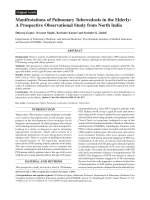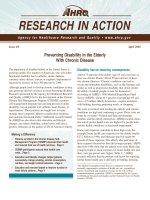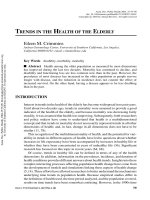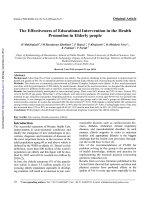Management of Bipolar Disease in the Elderly ppt
Bạn đang xem bản rút gọn của tài liệu. Xem và tải ngay bản đầy đủ của tài liệu tại đây (1.04 MB, 29 trang )
Management of Bipolar Disease
in the Elderly
M. Cornelia Cremens, MD
Director of Inpatient Geriatric Consultation
Division of Medicine and Psychiatry
Massachusetts General Hospital
Sunday August 3, 2008
9:00 - 9:50 am
Concerns of Older Adults
Quality of life
Mental and physical health fundamental to a
more meaningful life
Many more issues in late life
How to avoid – early treatment/prevention
Increasing numbers struggling with mental
health issues
Good news
Most seniors enjoy good mental health
Psychiatric illness is not part of normal aging
NIMH 1:5 diagnosed with mental illness
Growing population mentally ill
65+ 20 million in 1970 (7 million)
65+ predicted 70 million in 2030 (15 million)
Mental Health Issues in Aging
Most common psychiatric disorders in late-life
Anxiety (includes phobias and OCD)
Cognitive impairment and delirium
(Alzheimer’s disease)
Mood disorders (depression and bipolar)
Range of severity from problematic-severe
• Suicide highest in this age group
Older Adults Avoid Psychiatrists
Mental health services underutilized
Stigma
Denial
Lack of services, access outreach
Poor coordination of services and
follow-up
Psychiatric Evaluation of Older Adults
Psychiatric assessment
Rule out pre-morbid psychiatric illness
Rule out co-morbid medical illness
Functional Assessment
ADLs
• mobility, dressing, hygiene, feeding and toileting
IADLs
• independent living, shopping, cooking,
telephone, housekeeping (light), medications,
finances, transportation
Evaluation
Complete history
Psychiatric, medical, neurological
What is different in evaluation?
Evaluation
Complete history,
• Prior clinicians, medical records,
medications
• often need family to give history
Psychiatric, medical, neurological
Psychiatric assessment
Rule out pre-morbid psychiatric illness
Rule out co-morbid medical illness
Evaluation of Function
Functional assessment
Activities of daily living
Feeding, Bathing, Dressing, Transferring, Toileting
Instrumental activities of daily living
Finances, Telephone, Medications, Shopping, Cooking
Housework, Ambulating, Laundry
Presentation of Illness
Often atypical may present as
Falls Behavioral changes
Behavioral changes
Cognitive deficits
Functional losses
incontinence
Non-specific signs and symptoms
Evaluation of Older Patients
Cognition
Assessment Mini-Mental State Exam (Folstein)
Affect
Sleep Interest Guilt Energy
Concentration Appetite
Psychomotor activity
Suicide
Psychosis
Medications, get a list
Bring the bottles in to appointment
Current list
Names of prescribers
Dates on bottles
Over the counter
Herbal
Borrowed from a friend
Old medications, saved
Most commonly prescribed
Cardiovascular
Diuretic
Antihypertensive
Vasodilator
Digoxin
Psychotropic
Analgesic
narcotic
antiarthritic
Laxative
antispasmodic
Common culprits
Over the counter sleeping pills
PM combinations
Allergy medications, antihistamines
Cough syrup, alcohol or dextromethorphan
Cold preparations, pseudoephedrine
Narcotics
Illicit drugs, cocaine, MJ
Alcohol, intoxication or withdrawal
More culprits, prescribed
Any medication or substance
Dopaminergic medications
Steroids
Stimulants
Benzodiazapines
Cardiac medications
Herbal preparations
Psychosis
Common Types of Psychosis
Delirium
Dementia
Depression
Mania
Psychosis
DSM-IV definition one or more of:
Hallucinations
Delusions
Disorganized speech
Disorganized or catatonic behavior
Psychosis
Dementia
Delusional disorder
Charles Bonnet Syndrome
confused with psychosis
poor response to medications
Rule out
alcoholism
substance abuse
Prescribed drugs
Illicit drugs
Demographics of Bipolar Illness
in the elderly population
Epidemiology
Underreported or not diagnosed
Prevalence
1% general population
1.2-1.3% 1-year community based
Bipolar Illness
Bipolar illness - onset often early in life
10% of patient with BPI onset >50 years
First onset of mania or hypomania is rare
in the elderly
Patient often presents with depression first
Not usually hypomania or mania
Bipolar Illness
Associated with or complicated by
cognitive impairment
substance abuse
co-morbid illness
history of depression
Secondary mania due to medical conditions or
neurological disorders is diagnosed more
frequently especially with dementia
Bipolar Illness
Symptoms of mania or hypomania the elderly
>anger or irritability - aggressive behavior
less grandiosity or euphoria
longer episodes of mania
cycling may be more rapid
pervasive delusions and paranoia
inconsistent treatment response
Definitions
Syndrome of 1 or more manic episodes
accompanied by 1 or more depressive
Seasonal patterns
Mixed states have significant dysphoria in
manic states
Secondary mania, symptoms in the context
of delirium, dementia, MCI or toxic
Diagnosis of BPI
Correct diagnosis is key to treatment
Hypomania can be easily missed
Depressive states more disabling
Usually first episode of BPI is depressive
Clinical course most salient clinical feature
rather than characteristic of individual
episode
BPI is difficult to diagnose
Manic symptoms establish diagnosis
Absence of manic symptoms - not ruled out
Misdiagnosis of unipolar depression
Diagnosis of manic symptoms, historic
establish diagnosis
Irritablity vs euphoria
Family or third party informer
Mneumonic useful in diagnosis
Distractability
Impulsivity, indescretions
Grandiose
Flight of Ideas
Activity increased
Sleep decreased
Talkative, pressured speech
devised by Dr William Falk at MGH
Diagnosis of Bipolar Depression
Subtlety in interview style
Inability of patient to recognize symptoms
Lack of insight
Depressive symptoms bring patient in
Poor memory of manic symptoms
Greater stigma than diagnosis of depression
Predictors of Suicide
age
male sex
isolated, divorced or separated
debilitating illness
widowed
alcohol
Other causes to consider
Medical disorders
Metabolic, Uremia
Thyroid disorder
Infection or delirium
Neurologic lesions, seizures
Medications
Deficiencies –
vitamin B12
Niacin
Confused with Dementia
Alzheimer’s disease
Vascular dementia
Dementia due to trauma
Lewy body disease
Frontal lobe dementia, Pick’s disease
Parkinson’s related dementia
Prion disease
Psychosis in Dementia
high prevalence and incidence
episodic or persistent
can appear early or late
Categories of psychosis in dementia
Delusions
Hallucinations
Misconceptions
Behavioral Psychological Symptoms
of Dementia (BPSD)
Psychological
Disorganized or illogical thought process
Perceptual disturbances:
hallucinations/illusions
Delusions or thought content not reality-based
Behavioral
Agitation and anxiety
Aggression, hostility, uncooperativeness
Apathy
Wandering
Involuntary Emotional Expressive
Disorder (IEED)
Damage brain areas control emotional output
Also referred to as:
Pseudobulbar affect
Emotional incontinence
Affective or emotional lability
Pathologic laughing or crying
Anxiety common comorbidity
Must be addressed
Benzodiazapines may cause confusion
Antidepressants may precipitate mania
Psychotherapy, individual or CBT
Sleep Disorders in the Elderly
related to BPI
Evaluate and treat psychiatric or medical illness
Rule out sleep apnea
Medications, including OTC medications
Alcohol
Other substances, especially stimulants
Alcoholism
Mimics many medical and psychiatric illnesses
Treatment program essential for refractory
disease
May need medications when sober
(antidepressants)
Hospitalization required for detoxification
Suicide risk - greatest in this group
Alcoholism
Life long pattern of drinking every day
even small amounts every day – problem
withdrawal life threatening
Symptoms include
insomnia
memory loss
confusion
anxiety and/or depression
somatic complaints mimic medical illness
Elder Abuse
Subtle presentation
Not responding to medications
Fearful or increased startle
Delusional
Family/caregivers may be overwhelmed
Hotlines in every state
Treatments
Psychopharmacologic therapy
Individual psychotherapy
Supportive psychotherapy
Cognitive behavioral therapy
Group therapy
Family therapy
Caregiver support group therapy
Treatment
Evidence-based research minimal
Elderly not usually recruited
Increase in older participants mostly healthy
Too much for frail - not enough for robust
Trials should include those who will benefit
Difficulty in assessing the health status
Treatment of Mania and Depression
Complete differential diagnosis including medical issues
Assess suicide risk and potential adverse effects of treatment
Careful individualization of treatment choice
Education of patient, family, caregivers and support system
Adequate treatment and adherence
Attentive monitoring and follow up
Use of individual or combined somatic therapies in
combination, when appropriate, with psychotherapy
Treatment - medications
Polypharmacy nature of symptoms
Lithium
Anticonvulsants
Antipsychotics
Antidepressants
FDA approved for mania
Lithium
Divalproex
Carbamazepine
Lomatrigine
Aripirazole
Olanzapine
Quetiapine
Risperidone
Ziprazodone
Atypical Antipsychotics
Less dopamine blockade and significant 5-
HT 2A
Less depressionogenic effect
First generation antipsychotics
Increase antidepressive episodes
Second generation
Reduce both acute and ongoing
depressive symptoms and syndromes
Mortality and antipsychotics
Atypical antipsychostics black box warning
First generation not established
Mortality associated with mania
Mortality associated with depression
Treatment
Lithium treatment for mania begin low
Lithium carbonate 150-900 mg/d
Underlying medical conditions or medications can
preclude its use
Lithium can be toxic at low levels in elderly
risk of fluid shifts
dehydration
toxicity
Anticonvulsants more suitable
lower side effect profile
increased efficacy
Antipsychotic especially the atypicals good response
Minimal side effects
Antipsychotics
Atypical anti-psychotics
clozapine 6.25-100 mg WBC weekly,
excessive drooling,
hypotension
risperidone 0.25-3 mg significant EPS
olanzapine 1.25-10 mg weight gain, diabetes
quetiapine 6.25-300 mg sedation, hypotension
aripiprazole 10-30 mg insomnia, agitation
ziprazidone 20-160 mg cardiac issues related to
increased QTc
Anticonvulsants
Carbamazepine 50-600 mg/d drug interactions,
ataxia
Valproic acid 125-1500 mg/d weight gain,
sedation
Gabapentin 100-1800 mg/d ataxia,
sedation
Lomotrigine 5-400 mg/d rash, TENS,
Stevens-Johnson
Adverse side effects to medications
Lithium
•
neurological, renal and thyroid problems
• polydypsia, polyuria, edema weight gain
and EKG changes
Divalproex
• Sedation, tremor, gait disturbance
Atypical antipsychotics
• metabolic syndrome EPS, weight gain,
EKG changes, increased mortality
Electroconvulsive Therapy
Resistant to treatment with medications
Intolerant of side effects from medications
Due to worsening medical illness
Psychosis associated with depression
Severity of depression
Risk of suicide
20-45% older patients are psychotic









